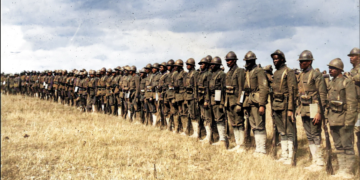Nov 29, 2024 Story by: Editor
University of Texas at Austin professor Talitha LeFlouria delivered an insightful presentation on “the South’s most inconspicuous workforce” — incarcerated Black women — during a lecture Tuesday afternoon at Harris Hall.
The event, attended by over 70 community members, was part of the Chabraja Center for Historical Studies’ annual lunch lecture series, designed to foster discussions among faculty and graduate students on historical topics.
LeFlouria, a nationally acclaimed historian and award-winning author, is best known for her book Chained in Silence: Black Women and Convict Labor in the New South. This six-time award-winning work sheds light on the harsh conditions endured by Black women and their significant contributions to the Southern economy during the convict lease and chain gang systems in late 19th-century Georgia.
Reflecting on recent public discussions about convict leasing, LeFlouria shared that it has deepened her understanding of the practice’s history and her research.
“Now I see a book that not only highlights the impact of slavery’s legacy on Black women’s lives but also provides insight into the history of mass incarceration through (Black women’s) historical experiences,” LeFlouria said.
During her presentation, she examined the history of Black women in the broader context of mass incarceration, focusing on the U.S. convict lease system.
LeFlouria explained that long before modern systems targeted Black communities through associations with drugs and gun violence, frameworks already existed to criminalize and disproportionately imprison Black people.
“Before there was a war on drugs, there was a war on Black freedom,” she said.
Starting in 1865, she noted, Black people in the South were mass arrested for “Freedom Crimes,” a category created under the Black Codes, which were revisions of the Slave Codes. These codes criminalized acts like vagrancy, firearm possession, and even insulting gestures — but only when committed by Black individuals.
Following the Civil War, the incarceration rates for African Americans surged by over 500%, with Black individuals comprising more than 90% of the total incarcerated population. By 1970, LeFlouria highlighted, Georgia housed 90% of the South’s incarcerated Black women in private contractor jails.
Black women became a critical workforce in the South, transferred between labor sites to perform arduous tasks such as building railroads, mining coal, and producing bricks on plantations.
“The legacy of the convict lease system still lives on today, where Black people are criminalized and disproportionately incarcerated,” LeFlouria stated. “Forced prison labor is alive and legal.”
She drew connections between the labor of women in convict leasing systems and modern examples of forced prison labor, citing instances like incarcerated people producing Whole Foods products until 2015 and Victoria’s Secret products in the 1980s.
LeFlouria now collaborates with A New Way of Life Reentry Project, an organization dedicated to supporting formerly incarcerated women through educational and work opportunities. As part of her involvement, she conducts historical research and teaches through the Women Organizing for Justice and Opportunity leadership program.
“Today, I focus on the experiences of incarcerated Black women to ensure that their stories are included in the history that often overlooks them and also as a way of highlighting the historical injustices that they faced within our criminal legal system for centuries,” she said. Her work also provides historical context to help incarcerated women understand their present-day exploitation.
Joshua Crutchfield, a postdoctoral fellow in Northwestern University’s Black Studies department, reflected on the media’s portrayal of Black women and its impact. As a graduate research assistant for LeFlouria, Crutchfield contributed to research on convict leasing camps and the representation of Black women in those institutions.
“The media coverage around (incarceration and crime) is racialized, and so I think you start there,” Crutchfield said, emphasizing the need to view these women as individuals who have been criminalized rather than as criminals.
Medill sophomore Maiya Wahl also commented on the subject, noting the discomfort society feels when critiquing current systems.
“We seem to be more comfortable criticizing institutions when we’re looking at them in the rearview mirror,” Wahl said. “When it comes to institutions directly in front of us that have eerily similar characteristics to the past, we don’t bring that same moral assurance as we otherwise would.” Source: Daily North Western

















